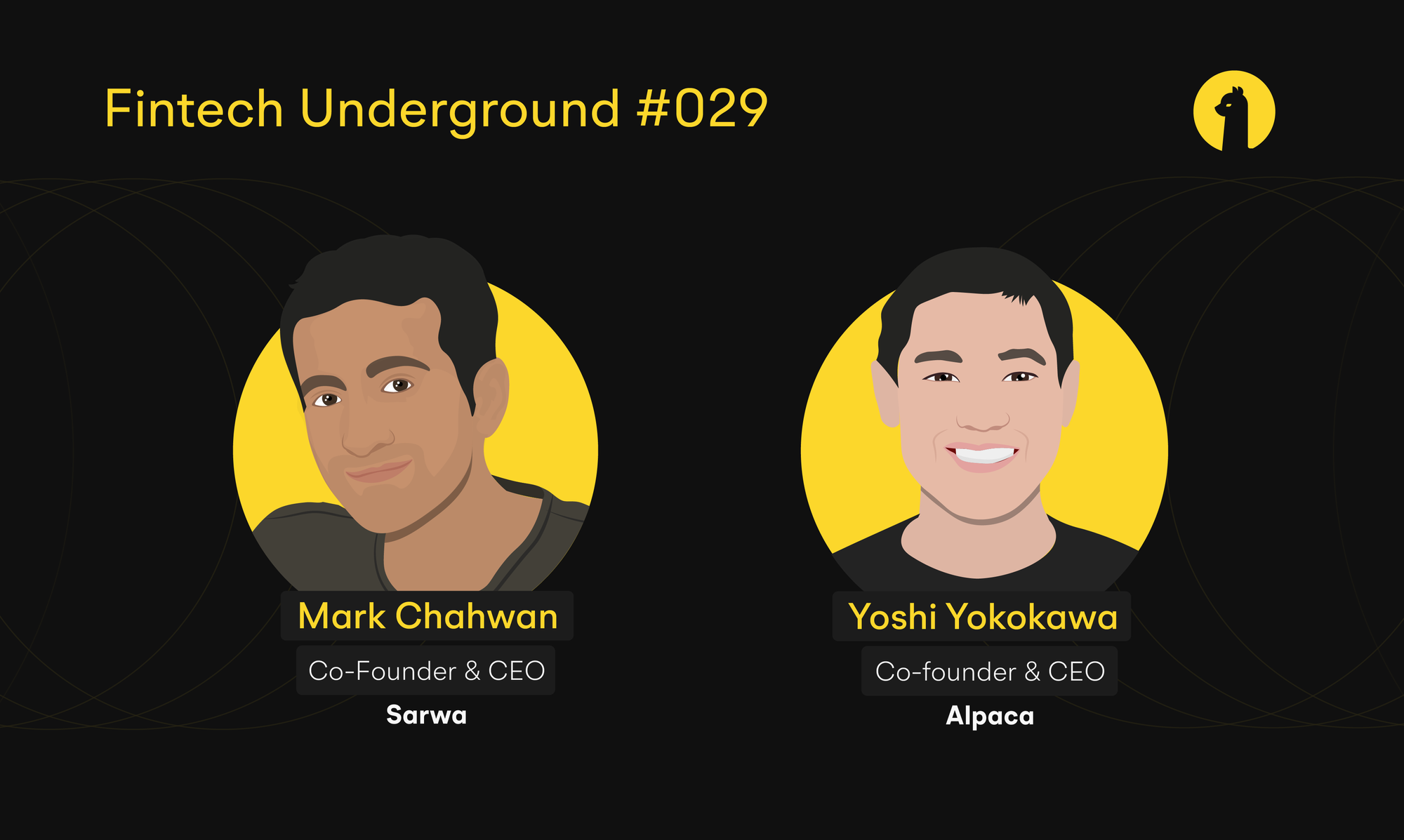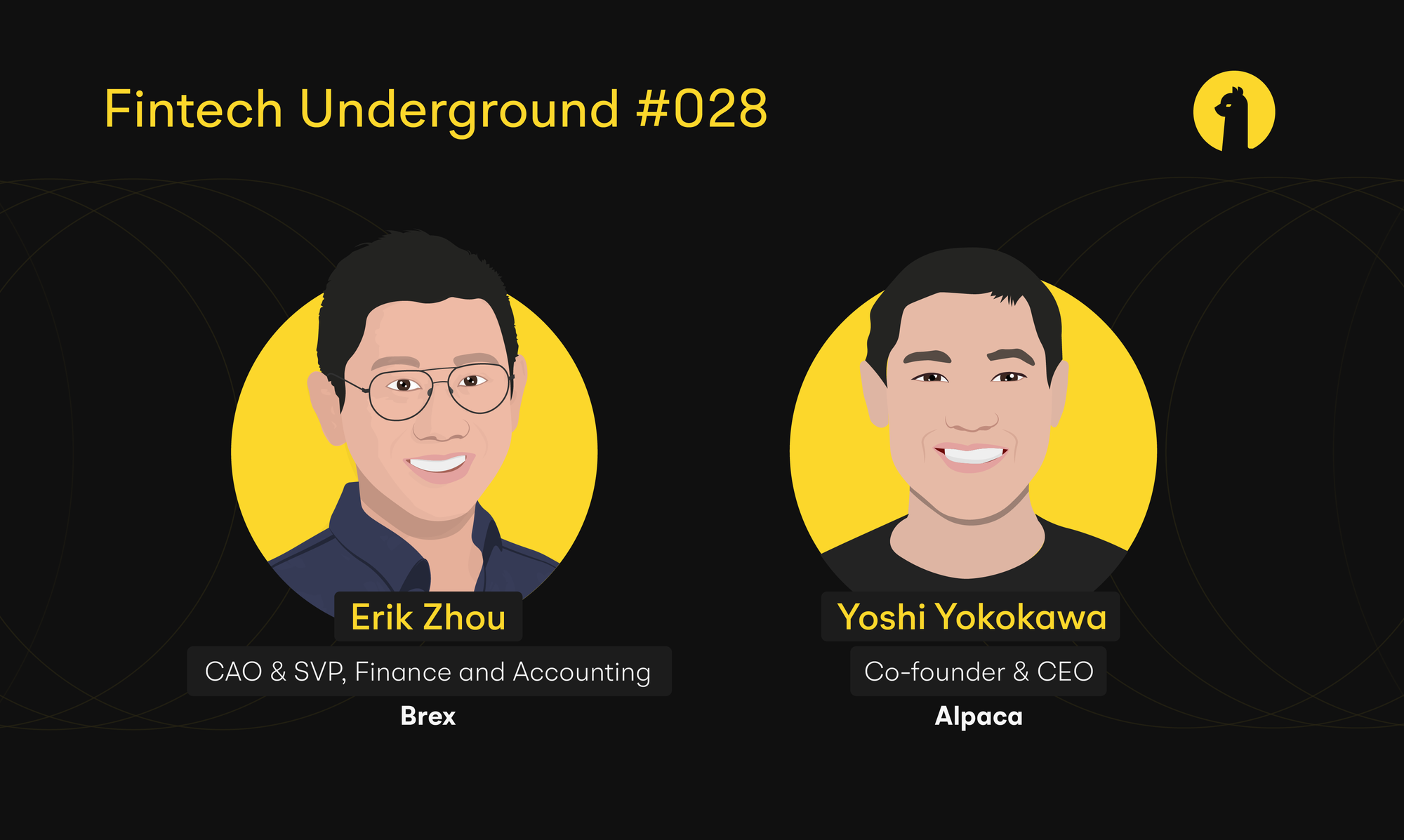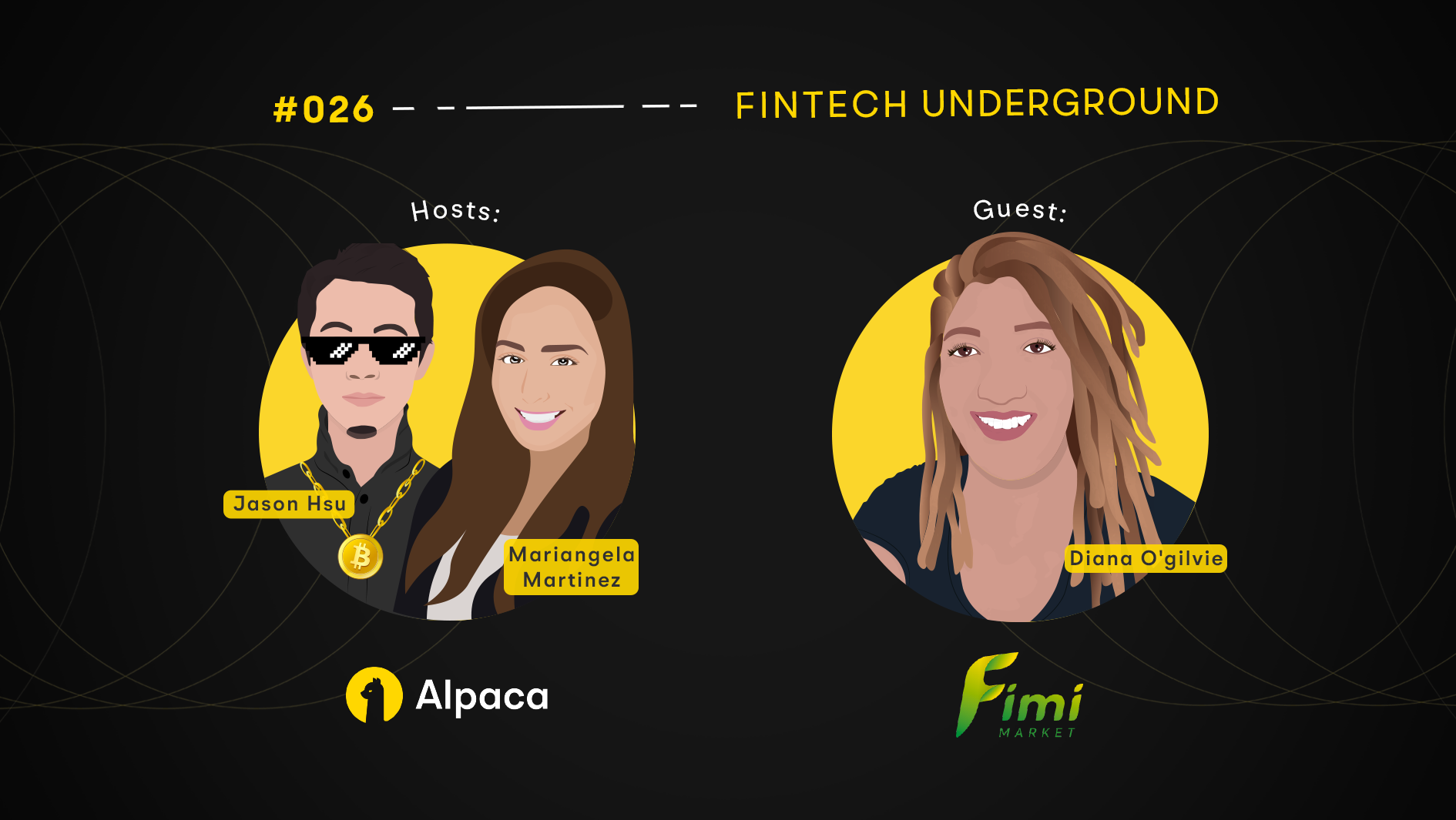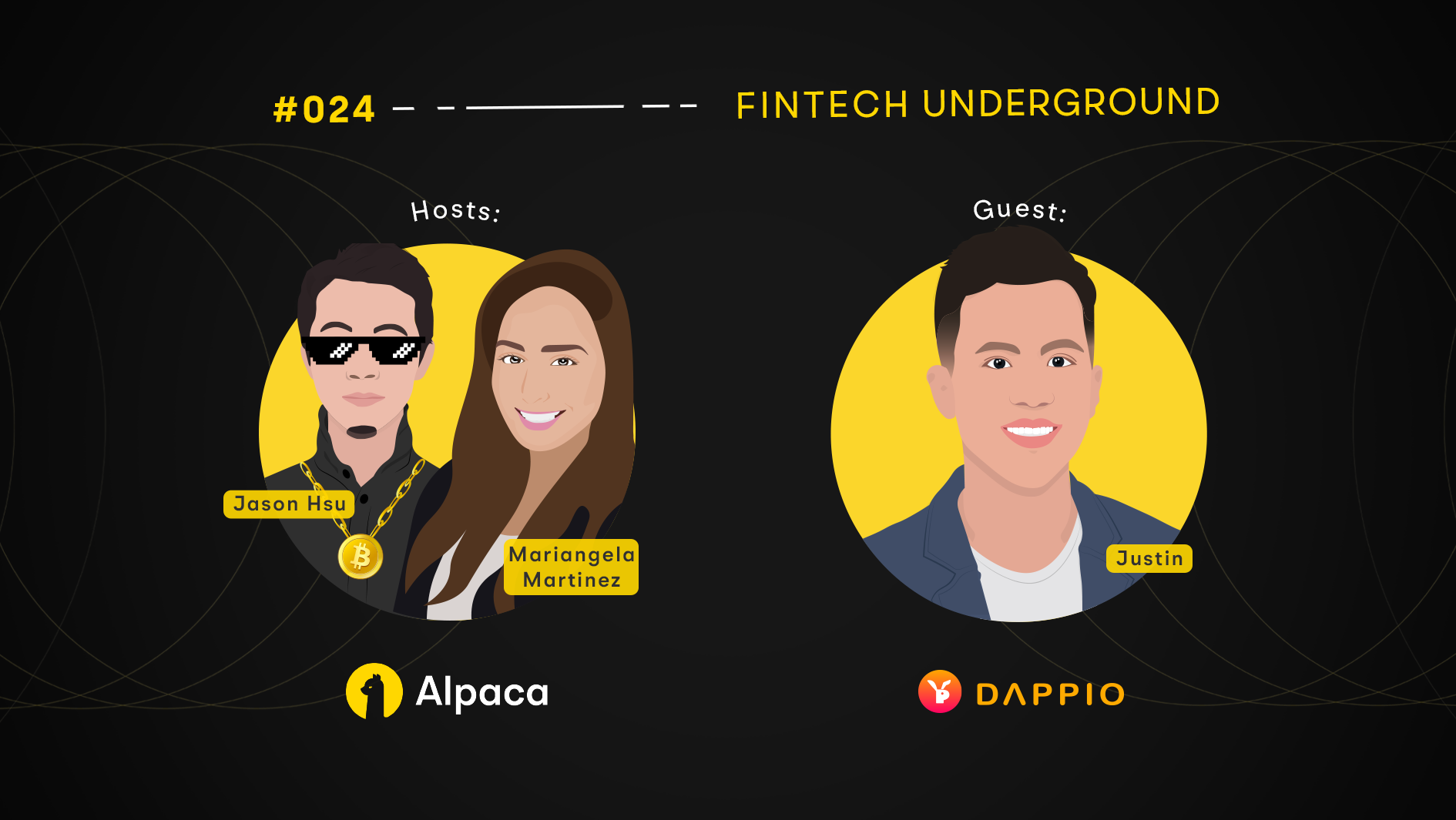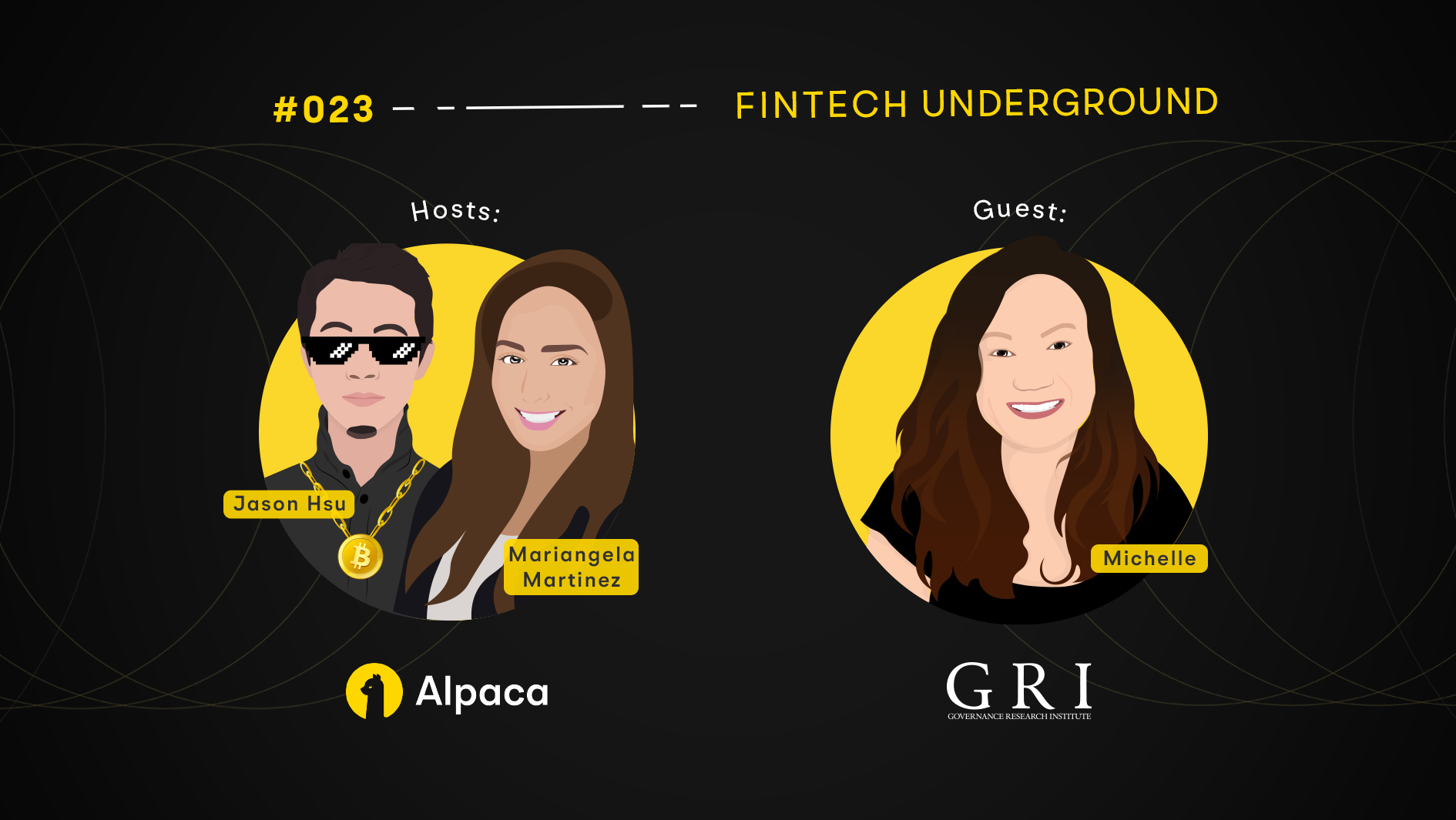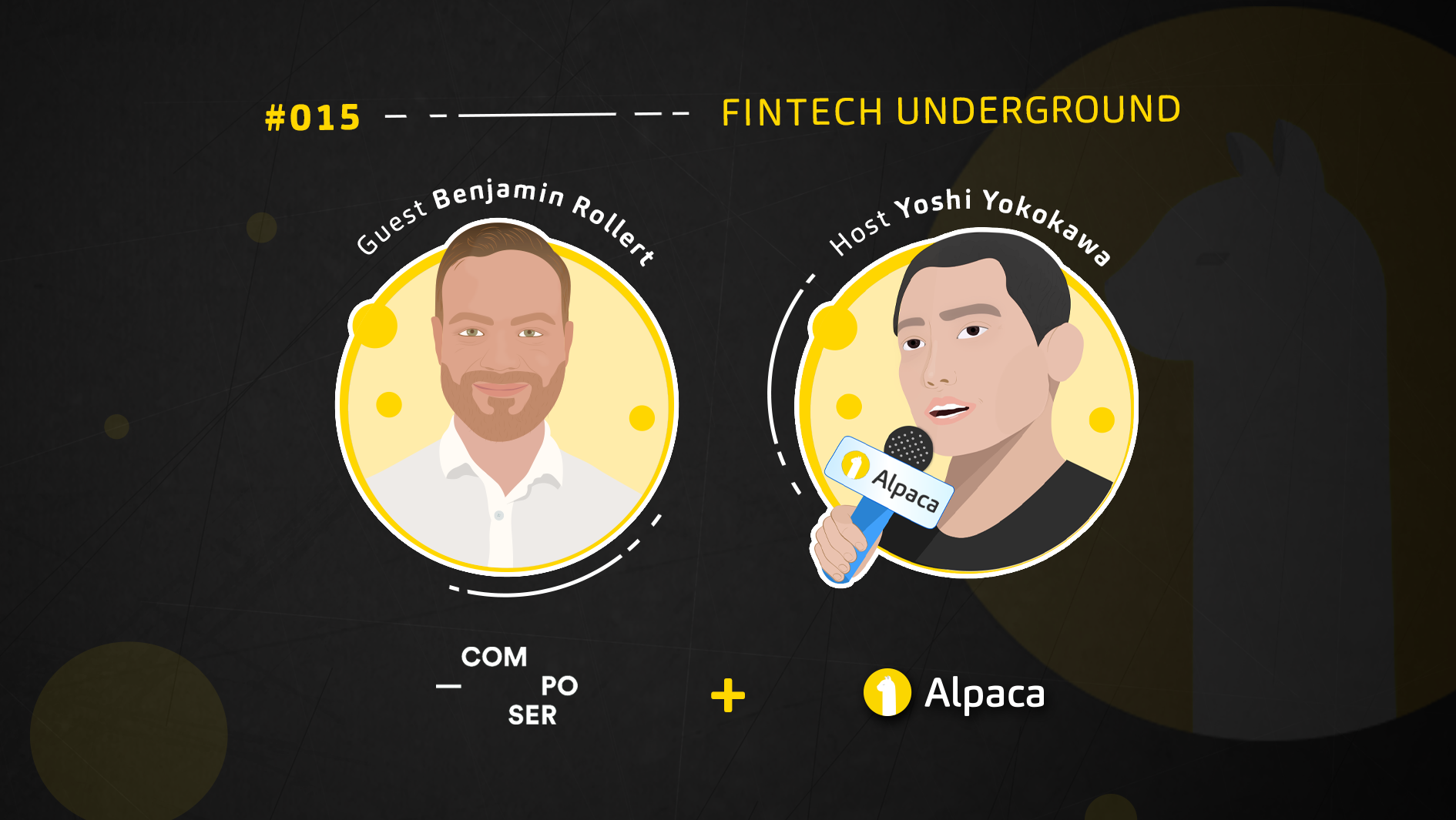
Any opinions expressed are opinions of the host and their guests. The content is for general information only and is believed to be accurate and reliable as of posting date but may be subject to change. Alpaca Securities LLC does not recommend any specific investments or investment strategies. Alpaca Securities LLC does not provide investment, tax, or legal advice.
Fintech Underground by Alpaca is a podcast devoted to all topics related to stock trading and APIs. From trading with algorithms or connecting apps or building out services, we aim to bring light to the different corners of Fintech.

TL;DR
In Episode #15 of Fintech Underground by Alpaca, we interviewed Ben Rollert. As the CEO and Co-founder of Composer, a no-code, visual editing tool for building automated investing strategies, Ben discusses the low-code, no-code phenomenon, what makes Composer different, and the roadmap ahead.

Find the full transcript below. To hear more CEO/Founders from the most interesting Fintech companies speak about their experience in the industry, check out our other episodes below.
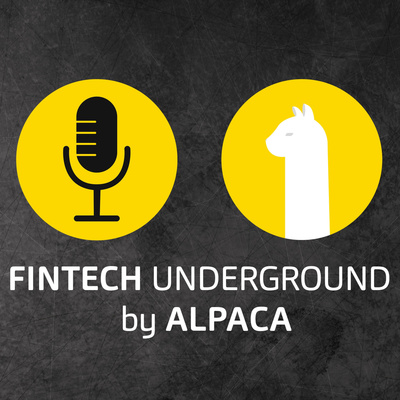
Full Transcript
Crystal: [00:00:00] Hi, everyone. Welcome back to Fintech Underground by Alpaca, the podcast devoted to stock trading API. From algorithmic trading to connecting apps to building out services, Alpaca is built for developers and traders. In each episode, we aim to explore a different area within fintech, and today we're very excited to have Ben Rollert, the CEO and Co-founder of Composer, a no-code visual editing tool for building automated investing strategies, on our podcast. As usual, Yoshi, CEO and Co-founder of Alpaca is our host. Let's dive right in!
Yoshi: [00:00:36] Hey Ben, how are you? Thank you very much for coming to our podcast, Fintech Underground.
Ben: [00:00:41] My pleasure, Yoshi, great to be here.
Yoshi: [00:00:43] Firstly, I want to ask you this, where are you right now?
Ben: [00:0047] I am in Washington, DC at the moment at my aunt and uncle's place. I'm kind of in a nomad situation.
Yoshi: [00:00:55] Yeah, you have a beautiful background! I think you also had a beautiful background when I talked to you last time and you were in Nicaragua.
Ben: [00:01:04] Yes, we actually started the company while I was living in Nicaragua in the midst of the pandemic. So we are definitely a COVID baby, definitely very much a remote-first company. We closed our last two rounds of financing entirely in Nicaragua, with me in Nicaragua. The rest of the team was obviously in other locations.
Yoshi: [00:01:26] Congrats on that!
Ben: [00:01:27] Thank you, man.
Yoshi: [00:01:29] Congrats, congrats. And speaking of the two rounds of financing before talking about Nicaragua and your personal history and story - do you want to introduce quickly what Composer does and what you do at Composer?
Ben: [00:01:42] Yeah, for sure. The really quick sound bite is Composer is a no-code platform that allows you to create automated trading strategies without having to write a single line of code. Hence, no-code. This came about when I was realizing that even implementing relatively simple, systematic strategies required a lot of work.
And of course, this was before I discovered Alpaca, but in the days of trying to hack on Interactive Brokers’ API, it was tremendously laborious and difficult to even do very simple things. It all came about as a very much bottom-up realization that's now grown into Composer today.
Yoshi: [00:02:20] Great, and you are the one who did the fundraising, so your job has been mainly the CEO and also thinking about the product vision as well, from Nicaragua?
Ben: [00:02:34] Yeah, that's right. COVID has definitely completely changed things. So the context is, my wife is from Nicaragua originally. I've been working back and forth between New York and Canada. I was in Canada when I saw the writing on the wall; at this time there were still people in denial. And clearly a lot of companies were in denial about what was happening. But it finally just hit me. I'm like, okay, there are going to be mass lockdowns, inevitably.
So I flew down and like days before they did announce the lockdowns everywhere. The nice thing with Nicaragua is, on top of having friends and family there, it was just very open, right? It's not a super developed country, so there's still a lot of things. And there's still a lot of open spaces and things to enjoy without having to be in contact, frankly, with other people. So it was comparatively a nicer place, in many ways, to do quarantine.
Yoshi: [00:03:25] Yeah, definitely. I remember visiting there almost 20 years ago, but I remember the beautiful lakes and mountains that show up on the TV shows. So I was actually very jealous hearing that you are in Nicaragua.
Ben: [00:03:41] Yeah, the crazy thing is just the number of microclimates. So you can drive thirty, forty minutes and you're in a completely different climate. We also climbed decent proportion of there's like 16 active volcanoes or something like that. Uh, and we climbed a number of them. So that was sort of our weekends COVID activity was climbing volcanoes or things like that. So to help stay sane.,
Yoshi: [00:04:00] I'm sure during those hikes you had to do a lot of brainstorming.
Ben: [00:04:05] Yeah, exactly. I mean, it's really given the nature of how work has changed and how work is very much about the speed and quality of your internet connection more than it is your physical location. So certainly, the nature of work has shifted dramatically.
Yoshi: [00:04:25] During those brainstorming sessions I'm sure you had to think about how to productize Composer. I think we chatted about this multiple times, but the low-code, no-code phenomenon is coming for many places and industries.
I think that you are kind of a poster child in retail investing for low-code, no-code. At the same time, it's not easy to really productize it, right? There are many similar ones that came up. For us also, we're working on no-code.
It's more like algorithmic trading platforms in the past. And I think you had a pretty unique view and a concept of how you wanted to productize it. I'm sure you did a lot of brainstorming during those hikes, but do you want to talk about how you had this foundation and the core philosophy when you were building Composer, thinking about the persona, and thinking about the unique approach that you have?
Ben: [00:05:38] Yeah, it's true. I mean, there have been tons of attempts at this in the past. I think that one of the big differences is frankly, shout out to Alpaca, if I remember correctly, part of your impetus to work on Alpaca is that you were trying to do something similar to what I'm doing now, but there was a piece of the value chain that was just fundamentally missing - which is a broker first API that acts as a clean REST API. That was something that just didn't exist.
And so I think that the ecosystem developing has allowed us to have the luxury to really focus on product development and product design from the user standpoint, right? Instead of spending all of our time on operational complexity, and we still have some of that, of course, you know, we are, uh, we are registered with the SEC. We are a registered investment advisor, but we're not a broker, right?
That frees up a lot of energy and creative juices to really focus on developing just really beautiful software for the end-user. That said, it remains a phenomenal challenge. And if you think about something like Excel, and I wrote an article actually a few months ago about why Excel is so enduring.
And I think the incredible thing about Excel as the original no-code tool, it's one of the only tools that is both usable and flexible. And that sounds almost like, you know, vocus or banal, but there are very few tools or visual programming languages or interfaces that are highly flexible and highly usable.
Usually, you have to trade off one for the other. So there's very usable software; you know, Instagram is quite usable. I wouldn't say it's super flexible beyond its very specific use case. Whereas C++ is quite flexible, I wouldn't say it's usable for most people. Excel is so remarkable and one of the biggest inspirations, because it is simultaneously extremely usable and extremely flexible. It's not perfect I guess, but, you know, I think it is technically a Turing complete language. Now they've actually created ETFs. Uh, so you have this thing that, you know, has hundreds of millions, literally hundreds of millions of people know how to use Excel. And it's a turning complete language there. Unwittingly, you have all these people that are actually programmers, like the most popular programming language in the world by an order of magnitude is Excel.
That is a phenomenal achievement. That's really like if I think about that, that alone, getting something that is that usable and that flexible is one hell of an audacious goal. And I think the key there is starting with usability, right? A lot of low code, no code stuff and trading is frankly like a not very good imperative programming language.
Like it, it kind of feels like you're using, you know, you're in IDE and by trying to abstract away an actual programming language, they just create more confusion. And a lot of them that I've tried, I want to talk for anyone specifically, but most of the ones I've tried, they throw weird uninformative errors. They're not properly constrained. So a good interface, if it's, you know, a good no-code interface, you shouldn't be getting cryptic error messages at that point, just give someone Python. And I'm someone that does know how to use Python. I do know how to use RNA. I do know how to use these things.
So I'm dogfooding and sitting there and like, is this actually, if you know, Python, is this actually better and easier? And if you throw out a lot of good note, low-code no-code stuff,a lot of the early adopters are actually engineers, right? There are people that are going "okay. I could code, but if I can get a more powerful abstraction and it saves me time, then I'll do it."
And if it's really well designed, then you start also getting non-engineers. And you're seeing that with things like Webflow and those are tools that are working.
Yoshi: [00:09:03] I think like, you know, when you think about that, like you bringing up the Excel as the go-to ideal state, as the like local no-code tool, like that is a really interesting approach. At the same time, you have not publicly launched yet, but I think there's striking this balance between flexibility and giving some framework. That's super difficult, right? Especially with investing and people think about automation.
People think about algorithmic trading. People think about, ETF type of the product, or people think about older rebalancing, like wealth from betterment type of product. There may need like use cases, even thinking about automation. So if you make it flexible, it becomes like, okay, what is this for?
And if there's some framework, okay, this is so niche. How are you scoring that balance? And how has the journey been for you? To kind of get to, yeah, I like this balance, as a CEO of this product and leading this.
Ben: [00:10:09] Long-term the answer is you need an incredible team, and I'm not just saying that to be diplomatic or gracious.
It's that for something like this, you need an incredibly talented product team. That sounds obvious, but you'd be surprised, especially in FinTech. They'd be like, oh, you can do with people who are good enough. It's like, no, for us, you need people as good as the absolute best product companies and with that orientation.
So it starts really in our culture and our DNA. We have product DNA, you know, we are not finance people that then maybe hired some engineers later, or hire designers later. Pretty much all of us come from tech product backgrounds, from product startup backgrounds.
So it's in our DNA. That's the first thing. We have an extreme focus on the customer and customer research. We didn't start with, well, there's this regulatory loophole, or we're going to automate this process, we didn't start from that perspective. We've done just hundreds and hundreds and hundreds of in-depth customer interviews.
We've done thousands of surveys. We have a full-time cognitive scientist on site. Post-doctoral level cognitive sciences, it’s incredible.
Yoshi: [00:11:19] You go super deep.
Ben: [00:11:20] Yeah, we have an amazing product designer. Our engineering team is small but just incredible. If you think about it that way, it's just in our DNA that we went really, really deep on UX. When we started out, we had a bigger UX team than our engineering team. It was actually out of balance, but we knew that this challenge is so formidable that we couldn't overestimate or overload that aspect of the team. Because we knew that from looking at the post-mortem of other attempts, that unless you really, really took the UX challenge seriously, you fail. That's a lot of it, right?
Yoshi: [00:11:51] Yeah, I think that makes sense. A lot of companies, including ourselves, when we were attempting the Alpaca algo, our low-code, no-code attempt to trading, I think you're right. That we approach more from the tech and engineering perspective instead of more UX. And I think that, reading again about your manifesto, you talk about Excel and Google docs, but you talk about Figma as well. And there's that kind of striking the balance and thinking about using more of the design and UX.
That leads to the next question that I wanted to ask - even though the low-code no-code phenomenon is happening right now, it seems that you have a scoring, getting the great investors on board.
I don't know how publicly you're talking about it. I'd love you to talk about it, but what made you successful in raising the funds during these low-code, no-code attempts, even right now in this retail investing sector?
Ben: [00:13:07] Yeah, what made us successful at fundraising? I mean, you could do a follow-up interview to get that perspective, but my interpretation of it based on the feedback was the team, and also the quality of what we have shipped in terms of where we're in closed beta right now.
We do have a product and the quality of the user experience of the product as it stands. And when I say user experience, not just the software; we do warm onboardings. So it's the whole life cycle of that customer journey. Just really thinking about it and really building almost like a luxury software experience.
Think about something like Superhuman or something at that level, trying to really almost over-correct for the emphasis on user experience on previous attempts. We rotated to the other extreme to really emphasize that this is different and that's how we stood out. Again, not mentioning specific names, but a lot of the feedback we got was, the other things that they've seen were just too narrow, frankly. Too niche or too nerdy; there's nothing wrong with nerdy, but in a way, that was just not for the people that maybe would be in that target.
They have better solutions in the form of, you know, they would probably just roll their own, use the open-source framework. So if they're really going that narrow, so, or they were too restrictive. So again, kind of goes back to the previous question. They saw the same thing.
This is really differentiated because either we see things that are just sort of trying to close source something that just already exists open source, or they look like I'm not much different than what an existing grub of advisor offers. They're extremely narrow that you can't really do any sort of sophisticated logic.
And so that's just not interesting. So I think they felt that we were actually striking that balance and I could actually truly, and I hate this phrase, but it's still the best way to say it. It just actually democratizes the stuff for the first time, in a way that people have tried in the past and not succeeded.
And then a part of it is velocity too. We have a small team. But one of the interesting things is our stack is entirely enclosure script. The investors saw I've been in contact with us for a while and they saw the velocity that we were able to ship out. And our velocity is just really incredible, especially for the size of the team.
It's just like we can develop things with a lot less resource than normally it would take, again by using interesting and modern frameworks and having a real highly talented team.
Yoshi: [00:15:22] Got it, that makes sense. When thinking about IRA components, you know, investment advisors and licensed stacks come into play, right?
How was your journey figuring that out? Because this comes because it comes with a very sensitive balance, how are you thinking about that journey? How are you planning to evolve your strategy on the license front?
Ben: [00:15:49] The interesting thing is that for a lot of this stuff, you're not actually strictly required to be an IRA, there are ways around it. So a lot of people in the space are not IRAs. If they're just saying I'm just a software provider, you do not have to be an IRA. But again, I think that really harms the user experience.
It really ties your hand behind your back in terms of what you can do, in terms of what you can offer to a customer, in terms of guidance and onboarding. So for example, one of the things we're working on is really creating great strategies that are pre-built. Things like templates, great templates that you might find on Notion or Figma or Airtable, or something like that.
Those things really help with getting people into the product and also giving people recommendations. If you start recommending things to people, it's very, very specific, the laws are very specific. You cannot recommend even a trading signal. You can't even say, this is an interesting trading signal. That's already giving advice. You cannot do that. But if you can not give anyone any advice, ever, how good of an onboarding experience, how good of a re-engagement experience, how good of a learning and mastery experience can you give to people? Really great products help you develop a sense of mastery.
If you're legally constrained from helping people make better decisions to use the product better, that's not great. So again, it gives us that optionality to do more things than if we weren't licensed, and serve our customers better. Because at the end of the day, it's not just about having cool software.
That's the other thing I'd say with some of these no code attempts. They were kind of cool, but at the end of the day, what's the job to be done, right? What are you trying to do with the software? Probably you want better risk adjusted returns? Well, we can really lean into that aspect of it, which is like, okay, our software is a means to the end. You probably have a goal and we can help you get to that goal.
Yoshi: [00:17:19] I think you're going to always be consistent about user-first and the user experience first, so if the license is required to create a better experience, you would be like, yeah, of course, I do have to do that. It seems that that is your approach and that completely makes sense.
And the next question that I wanted to ask - this may not be the right question since you're saying this balance of the flexibility and framework, but right now in the closed beta, what is the targeted persona and the use case that you are specifically focusing on?
So again, this question may not be relevant, since you may have already struck the balance of these two things, but if you can comment on that, that'd be great.
Ben: [00:18:04] No, no, I think it's a really valid question. Yeah, that's a really valid question. Right now we're really targeting our white-hot core. Our white-hot core is people who are actively looking to implement systematic trading strategies. So retail people, retail investors who are actively interested in systematic trading and have some idea of something they want to implement and they are frustrated for one of two reasons.
So there's sort of two sub cohorts here. One is developers who can do it, but they're like, this is taking too much of my time and I'm too busy. And right now is a crazy time to be a developer, obviously. There's a lot of opportunity everywhere and it's hard to justify the time. I've talked to some very senior engineers.
Is to describe just how much time it took to build some of just the boilerplate, to doing basic things. And it was just very frustrating. And the other is people who simply are not coders, are not at the level of coding that they could implement it. So they're doing things like going on Upwork and hiring people to help them implement things.
And so there's sort of that stage of solution-seeking behavior, that's the white hot core. Obviously there's sort of adjacent segments around that, but that's the core of people who are like, wow, I'm paying if you can give me back hundreds of hours of my life or thousands of dollars of contracting work.
And then they're really grateful for that. So they still have the flexibility to find what they want, but without having to do a full-time job.
Yoshi: [00:19:23] So when you say retail trading strategy, you mean more of the people who want to get pure alpha, or are you targeting more of that smart beta type of product and rebalancing, or are you not caring that much?
Ben: [00:19:38] I think it's both. In terms of strategies and what they're doing, we see a mix of both. I'm a user of the product, right? So what I like to use it for is less pure, pure alpha. What I would say is, and now I'm sort of projecting my own sort of philosophical beliefs about markets, I'm not a big alpha guy, just because I think you're always sort of just modifying an existing risk and maybe transforming it some ways, but it's always there, is what I've found. And alpha is so deceptive. That said, I do think that in aggregate you can get superior risk adjusted returns.
If you simply do a smart enough job of blending uncorrelated strategies. So that's a lot of what people are really looking for. They're saying, hey, can I have a framework that allows me to easily implement some uncorrelated strategies that each do roughly equally as well? And then obviously your risk-adjusted return is dramatically improved.
So it's not exactly the same thing as smart beta, right? I think of smart beta as usually applying to sort of pure buy and hold, but think, you know, sort of the similar philosophy, but applied to systematic trading. So maybe you have some risk parity here, but you also have some, uh, you know, you have some mean reversion stuff here, and then maybe you have some momentum stuff here, some pairs trading stuff there. And okay, all of these things are actually pretty straightforward strategies that do reasonably well. And they're not actually that correlated with each other and Composer creates a set of abstractions that makes it easy to blend those things.
So it's not exactly smart beta, but it's analogous to smart beta. So that's my bit of a long-winded answer. I think that's the holy grail, and I'm obviously I'm inserting my bias a bit here, but it does seem that early super fans have a similar use case.
Yoshi: [00:21:22] That makes sense. And talking about the next steps of Composer, you have this big vision for execution. You are adding a lot of different types of asset classes and starting from public security.
So what is your roadmap and schedule, if you want to disclose anything to the listeners?
Ben: [00:21:42] I will, and you guys got to help us. The next thing I want is Alpaca to offer crypto!
Yoshi: [00:21:48] Yeah. Yeah, man. It’s coming, it’s coming.
Ben: [00:21:50] I think even before we get to options and stuff, I want crypto, even before that. The ability to rebalance between cash equities and crypto is just killer. And it's so hard right now. If you think about it if you have your Coinbase account here and it a pocket account there. Well, then I have to do like ACH fund transfers to do any sort of systematic rebalancing. Like, forget it, right? That's just a pain.
So the ability to co-mingle crypto and cash equities would just be beautiful. And I would be so much, frankly, wealthier, better off, had that I known it at the time, right? Crypto is so volatile and it's sort of controversial for a lot of the crypto maximalists, but I don't think it's actually a very good hedge for many things. What I do love about crypto is it is pretty much uncorrelated.
So I don't think it's, there's no real evidence as negatively correlating or hedges things, but it is uncorrelated, which is amazing by itself. And it's highly volatile. So it's uncorrelated and highly volatile. And it has a very strong, upward sort of drift term. Well, being able to systematically rebalance, that would be, hindsight bias but when I look in the last few years, had I been systematically balancing my crypto holdings, oh my God. I think we'd all be doing better, probably. So that's certainly a dream.
Yoshi: [00:23:03] Got it, got it.
Ben: [00:23:04] So that's one of the big things. The other big thing on our roadmap is we definitely have a big content piece that's coming. We're going to start creating real content around the strategies and also creating some of our in-house strategies and sharing some of the stuff we've been cooking up internally. We really dogfood our own product, and so we've built some really cool stuff and we want to write about it and share it and make it accessible to people.
Yoshi: [00:23:26] Nice, nice. It's content and sharing open source. Always, always the best way to go. That's what we think about at Alpaca too.
Ben: [00:23:34] Yeah, big fan of you guys. I’m a big fan of the Slack community and stuff too.
Yoshi: [00:23:39] I appreciate that! Before wrapping it up, I always ask this question to the person who's coming on our podcast, but you've been doing finance roles a lot, right? Coming from a lot of like product-heavy and data science related stuff as well.
But as you come into FinTech, you have to deal with regulations and a lot of legacy components of the industry, which, you know, we want to change as well at Alpaca.
What do you think of it, do you think it's worth it to be in Fintech?
Ben: [00:24:26] Yeah, it's a great question. And this is something we have to even ask ourselves sometimes, because it's not easy, right? But there was a great Paul Graham piece called schlep blindness. And he talks about the Stripe founders, anything about Stripe. Having talked to some very senior people there, one thing I learned is that Stripe is amazing at making it feel like everything's programmatic, but they still have a culture of schlepping.
So schlepping for context is a yiddish term for just doing a chore that has to be done, that's a pain. And the reality is that, okay, they're amazing engineers, but it's embedded in our culture that everybody has to do a lot of dirty work.
You know, I found out that even Stripe Atlas, in the beginning, they were faxing stuff. They were literally sending faxes, engineers don't like faxing as a protocol or as a technology, it's not really fun.
Because there's schlep blindness, people ignore this stuff, right. So usually a lot of times, doing something meaningful isn't easy. And I think that's something, frankly, people in my generation would have to kind of like face. Marc Andreessen said this recently. He's like, don't follow your passion. Try to do something useful, even if it's hard. And I think that that's in our culture too.
To actually do something helpful and useful to humanity or other people, sometimes you have to do things that are not necessarily the most fun things, but it's more rewarding. And there's a bigger opportunity because there are a lot of people that are lazy or they don't want to do it. So, short-run, is it painful sometimes? Sure. But is it worth it? Absolutely.
Yoshi: [00:25:57] Thank you very much for your answer, and I'm glad to hear that. And thank you very much for coming to our show!
Ben: [00:26:03] My pleasure.
Yoshi: [00:26:03] Everyone, this is Ben from Composer. Thank you very much.
Ben: [00:26:07] Thanks, Yoshi.
Crystal: [00:26:08] Thank you for joining us today on this episode of Fintech Underground by Alpaca. As always, check out all of our past episodes on Apple Podcasts, Spotify, and other major streaming platforms.
If you liked this episode of Fintech Underground by Alpaca, make sure to check out our other episodes below!

You can also follow Alpaca and our weekly updates on our LinkedIn and Twitter.
Brokerage services are provided by Alpaca Securities LLC ("Alpaca"), member FINRA/SIPC, a wholly-owned subsidiary of AlpacaDB, Inc. Technology and services are offered by AlpacaDB, Inc.


